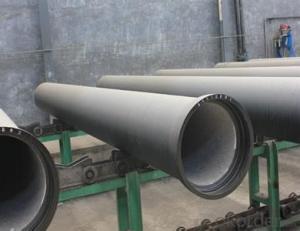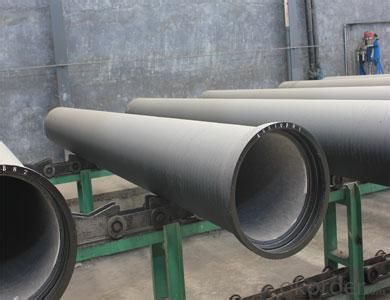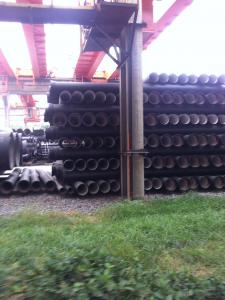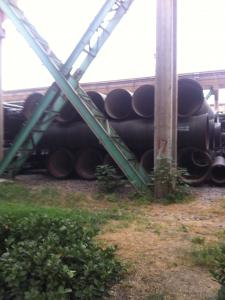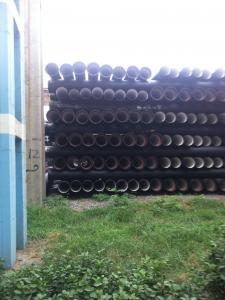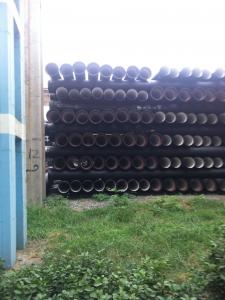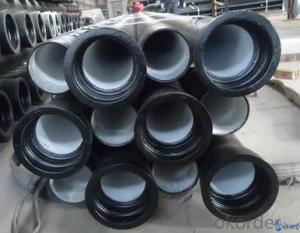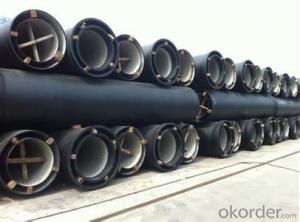DUCTILE IRON PIPES AND PIPE FITTINGS K9 CLASS DN150
- Loading Port:
- Tianjin
- Payment Terms:
- TT OR LC
- Min Order Qty:
- 22 pc
- Supply Capability:
- 3000 pc/month
OKorder Service Pledge
OKorder Financial Service
You Might Also Like
Material : Ductile Cast Iron
Size Range : DN 80mm to DN 2000mm
Unit Effective Length : 6m or 5.7m
Manufacture Standard: ISO 2531:1998/ EN 545:2006/EN 598:2007
Annual capacity : 200,000 tons
Coating Exterior: Zinc 130g/m2 according to ISO 8179-1 and bitumen coating 70 microns.
Cement Interior: Portland Cement/ High Alumina Cement/ Sulphate Resisting Cement Lining according to ISO 4179
Special requirements on external coating and internal lining can be applied
We also provide accessories such as SBR/EPDM rubber gaskets, lubricant paste, pipe caps, PE sleeves, etc.
Additional Parts:
Each pipe is strictly inspected according to related standard to ensure permanently high performance.
Easy Installation at site and service free for life
Long Service Lifespan
Quotation will arrive you within 24hours once we get your inquiry.
We guarantee offering you a competitive price.
A copy of original inspection reports of pipes will be offered after shipment.
Photos of loading process will be sent to the customer after shipment effect.
We will follow-up the delivery progress after shipment effect and update to the customer on weekly basis.
- Q: Can ductile iron pipes be used for water distribution networks in rural areas?
- Yes, ductile iron pipes can be used for water distribution networks in rural areas. Ductile iron pipes have excellent strength and durability, making them suitable for various applications, including water distribution. They can withstand high pressure, provide a long service life, and have good resistance to corrosion and external stresses. Additionally, ductile iron pipes are relatively cost-effective and require minimal maintenance, making them a reliable choice for water distribution networks in rural areas.
- Q: What is the relationship between the installation direction of the ductile iron pipe and the direction of flow?
- The ductile iron pipe is installed in the direction of the current.
- Q: What is the composition of ductile iron pipes?
- Ductile iron pipes are primarily composed of iron, with small amounts of carbon, silicon, manganese, and trace elements such as sulfur and phosphorus.
- Q: Do ductile iron pipes require special handling during transportation?
- Yes, ductile iron pipes do require special handling during transportation. Ductile iron pipes are known for their strength and durability, but they can be susceptible to damage if not handled properly. These pipes are heavy and can be quite large in size, so it is important to use appropriate lifting and handling equipment during transportation. Special care should be taken to avoid dropping or impacting the pipes, as this can lead to cracks or fractures. Additionally, pipes should be stored and transported in a way that prevents them from rolling or shifting, which could cause damage to the pipe coating or fittings. It is also recommended to protect the pipes from exposure to extreme temperatures or weather conditions during transportation. By following these guidelines and taking the necessary precautions, the risk of damage to ductile iron pipes during transportation can be minimized.
- Q: How are ductile iron pipes protected against internal corrosion?
- Ductile iron pipes are protected against internal corrosion through a process called cement mortar lining. This involves applying a layer of cement mortar to the inner surface of the pipe, creating a protective barrier between the iron and the water flowing through it. This lining helps to prevent the formation of rust, corrosion, and scale build-up, ensuring the longevity and durability of the pipes.
- Q: Can ductile iron pipes be used in areas with high soil liquefaction potential?
- When dealing with areas prone to high soil liquefaction, it is important to take certain precautions and considerations into account when using ductile iron pipes. Ductile iron pipes are known for their strength, durability, and resistance to external loads, making them suitable for various applications, including water and wastewater transportation. One essential aspect to consider is the depth at which the pipes are installed. It is advisable to install ductile iron pipes at a sufficient depth below the ground surface to minimize the effects of soil liquefaction. The appropriate installation depth will depend on factors such as soil conditions and the level of seismic activity in the area. To determine the correct depth, it is essential to consult geotechnical engineers and adhere to local building codes and regulations. In addition, it is crucial to use proper backfill materials and compaction techniques during the installation process. Utilizing granular materials like crushed stone or gravel for backfill can enhance the stability of the soil and reduce the risk of liquefaction. It is also important to ensure adequate compaction of the backfill to maintain the stability of the pipes and prevent settlement or movement during seismic events. Furthermore, when installing ductile iron pipes in areas prone to soil liquefaction, it is recommended to use flexible joints, such as restrained joints or push-on joints. These types of joints allow for some movement and flexibility, which can help absorb the ground's movement during an earthquake. This, in turn, reduces stress on the pipes and minimizes the likelihood of damage. Regular inspection and maintenance of the ductile iron pipes play a critical role in high soil liquefaction potential areas. It is essential to monitor for any signs of movement, settling, or damage and address any necessary repairs or reinforcements promptly. This ensures the continued performance and safety of the pipes. In conclusion, although ductile iron pipes can be used in areas with high soil liquefaction potential, it is necessary to take several measures into consideration. These include determining the appropriate installation depth, using proper backfill materials and compaction techniques, employing flexible joints, and conducting regular inspection and maintenance. Consulting with geotechnical engineers and adhering to local building codes and regulations is strongly recommended to ensure the suitability of the pipes in such areas.
- Q: How does ductile iron pipe perform in areas with high groundwater salinity?
- Due to its inherent resistance to corrosion, ductile iron pipe is highly effective in areas with high groundwater salinity. The presence of elevated levels of salt and minerals in the groundwater can lead to the corrosion and deterioration of certain materials, but ductile iron is highly resilient to this type of corrosion. Its composition and manufacturing process make it less susceptible to damage from corrosive elements found in high salinity water. The primary reason for the corrosion resistance of ductile iron pipe lies in its protective iron oxide coating, which naturally forms on both the interior and exterior surfaces of the pipe. This coating acts as a barrier, preventing direct contact between the pipe and the corrosive elements present in the groundwater. Additionally, ductile iron pipes are often lined with cement mortar or a protective epoxy coating, further enhancing their resistance to corrosion and providing an extra layer of protection. Moreover, ductile iron pipe boasts an extended lifespan, often surpassing 100 years, making it an ideal choice for areas with high groundwater salinity. Its durability and resistance to corrosion ensure that it can withstand the harsh conditions associated with high salinity environments, minimizing the frequency of repairs or replacements. In conclusion, ductile iron pipe is an exceptional option for areas with high groundwater salinity due to its corrosion resistance properties. Its protective iron oxide coating, along with optional linings, offers a dependable and long-lasting solution, guaranteeing the integrity and performance of the pipe system even in demanding environments.
- Q: Are ductile iron pipes suitable for use in agricultural applications?
- Yes, ductile iron pipes are suitable for use in agricultural applications. Ductile iron pipes are known for their high strength and durability, making them ideal for withstanding the heavy loads and pressures often found in agricultural operations. Additionally, they have excellent corrosion resistance, which is important in agricultural environments where pipes may be exposed to chemicals or fertilizers. Ductile iron pipes also have a long lifespan, reducing the need for frequent replacements and minimizing maintenance costs. Overall, their robust nature and ability to handle various agricultural demands make them a reliable choice for use in agricultural applications.
- Q: Can ductile iron pipes be used for underground sewage systems?
- Yes, ductile iron pipes can be used for underground sewage systems. Ductile iron is a strong and durable material that is resistant to corrosion and can handle the high pressure and constant flow of sewage. Additionally, ductile iron pipes have a long lifespan and require minimal maintenance, making them suitable for underground sewage systems.
- Q: How are ductile iron pipes connected together?
- Ductile iron pipes are typically connected together using a jointing method called push-on joint. This involves lubricating the spigot end of one pipe and inserting it into the bell end of another pipe. The two pipes are then pushed together until the spigot end reaches the center of the bell end, creating a tight and secure connection.
Send your message to us
DUCTILE IRON PIPES AND PIPE FITTINGS K9 CLASS DN150
- Loading Port:
- Tianjin
- Payment Terms:
- TT OR LC
- Min Order Qty:
- 22 pc
- Supply Capability:
- 3000 pc/month
OKorder Service Pledge
OKorder Financial Service
Similar products
Hot products
Hot Searches
Related keywords
